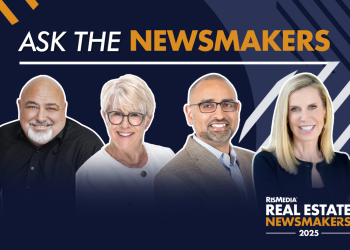Brian Copeland, 2019 vice president of the National Association of REALTORS®, has two words for agents and brokers across the country: “Be flexible.”
Before he founded and became CEO of Doorbell Real Estate in Nashville, Tenn., in 2018, Copeland was the 2011 National REALTOR® of the Year. He founded one of the largest technology camps in the country, attracting 1,500 real estate professionals from 30 states. He is one of the most sought-after real estate speakers in America, as well. He has emceed and keynoted some of the largest conferences in the profession, served as the 2017 president of Tennessee REALTORS®, and advocates for property rights at the local, state and national association levels.
His message about creating a flexible brokerage for tomorrow’s leaders involves encouraging brokers to step outside their current assumptions about what makes an effective, productive brokerage. It also means learning and practicing your leadership skills, as well as your brokerage skills.
“No matter where you are on your path, make sure you’re developing your leadership skills,” says Copeland. “The one thing that rings true for me is that people want to work with great leaders. Being a salesperson is part of being a great leader. So, what are you doing to develop great leaders among your brokerage?”
To create a flexible brokerage, companies need to consider and implement five steps that are the key to agent happiness and success:
- Identify Your Customers
Be very clear about who your customer is. Know who they are and what they actually want—not what you think they want. Be aware they’re not the customer or agent of the past; they want what they want when they want it, because they can get what they want when they want it. With the power and immediacy of the internet and technology, today’s agents and customers can find, do, see and watch the things they want on their time schedule. They expect the companies they engage with to deliver the same kind of experience.
- The Value of Space
In 2017, Copeland, along with 99 other brokers and agents, attended a two-day brainstorming event with Facebook founder Mark Zuckerberg. The meeting was focused on the concept of space and community-building.
Copeland says everything from employee dress codes to the size and configuration of offices is changing the way people interact, create and engage. Space—meaning office space, brokerage space, and where people work and do business—isn’t what it used to be, Copeland explains. Be prepared to make changes to space, community and culture that allow for more employee and client comfort—even if they’re radically different from what you’re used to.
- Payment Flexibility
It may be uncomfortable to talk about, but payment flexibility and options for changing how and when agents get paid is also important. Using the example of Chick-fil-A’s food app, Copeland talks about consumer-centric service and how to adapt and change the customer service experience to make payment and other services streamlined and positive for everyone.
- A Resilient Community Culture
Create a culture that’s agent-friendly.
“As brokers, we’re the only cheerleaders our people have. So what kind of culture are you implementing on a daily basis to show your people you truly care?” Copeland asks.
He points out how many current sales meetings are flawed. Rather than being dull, must-attend events that eat up time and aren’t helpful, they need to be powerful, motivational and valuable to your agents. Being able to remotely access a meeting, rather than drive in, park and attend the meeting in-person helps a lot, too. He practices what he preaches. Doorbell Real Estate has three sales meetings a week, each 15 minutes long, and they are all accessible through Zoom so agents don’t have to waste time commuting to a meeting unless they want to.
One of the secrets Copeland uses to structure his sales meetings is to rethink the time of the meetings. Most consumers want to meet with agents at 9 a.m., so he has his sales meetings at 10 a.m., giving agents time to meet with clients at the preferred 9 a.m. time slot before coming to a sales meeting. By having the sales meetings online, it makes it possible for agents to “attend” a meeting before moving on to meet with their next client. This, and other tips, he attributes to the book “Rockefeller Habits,” based on the leadership and management principles used by John D. Rockefeller, founder of Standard Oil. Sales meetings shouldn’t be the same old tired sharing of listings, but should address issues agents find critical to doing their jobs well:
- How do I save time?
- How do I make more money?
- How am I protected? (Copeland warns about copyright violations from the use of property photos, floor plans and other things REALTORS use daily.)
- Harmony of Expectations
What does your agent expect of you? Are you doing what you think they want, or what they really want? Copeland’s company pays for their agents’ MLS dues, century or supra entry cards, state, national, and local dues, and E&O insurance. There are terms agents have to follow, but those things are part of the package Copeland offers to meet agent expectations.
Finally, he says you’re not always going to be able to keep or make all your agents happy.
Give Unhappy People the ‘Gift of Goodbye’
“Stop trying to make unhappy people happy. You can’t make unhappy people happy,” he says. So, spend your time and money keeping your happy people happy and flush the others out of your life. Create powerful moments for the people who will make a difference in your brokerage.
Copeland offers a variety of tips on how to attract great agents and great clients by creating a brand that attracts the kind of agents he wants, and urges others to do the same. To hear his webinar in its entirely, go to https://register.gotowebinar.com/register/4162145586086184451?source=bcopeland-RIS.
 Mark Mathis is VP of Sales at Homes.com. For more information, please visit marketing.homes.com.
Mark Mathis is VP of Sales at Homes.com. For more information, please visit marketing.homes.com.
For the latest real estate news and trends, bookmark RISMedia.com.











